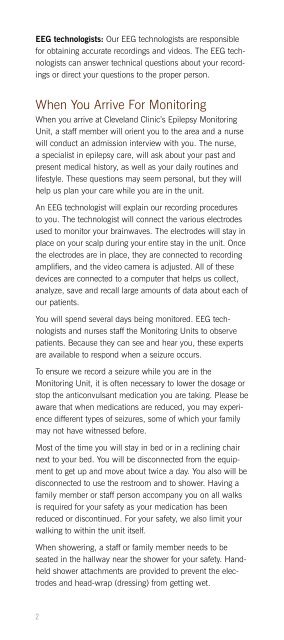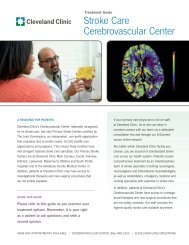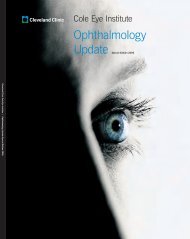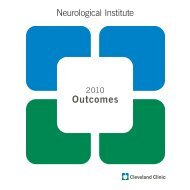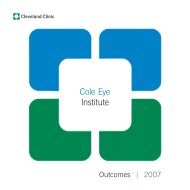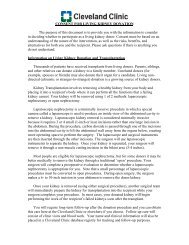Epilepsy Center - Cleveland Clinic
Epilepsy Center - Cleveland Clinic
Epilepsy Center - Cleveland Clinic
You also want an ePaper? Increase the reach of your titles
YUMPU automatically turns print PDFs into web optimized ePapers that Google loves.
EEG technologists: Our EEG technologists are responsible<br />
for obtaining accurate recordings and videos. The EEG technologists<br />
can answer technical questions about your recordings<br />
or direct your questions to the proper person.<br />
When You Arrive For Monitoring<br />
When you arrive at <strong>Cleveland</strong> <strong>Clinic</strong>’s <strong>Epilepsy</strong> Monitoring<br />
Unit, a staff member will orient you to the area and a nurse<br />
will conduct an admission interview with you. The nurse,<br />
a specialist in epilepsy care, will ask about your past and<br />
present medical history, as well as your daily routines and<br />
lifestyle. These questions may seem personal, but they will<br />
help us plan your care while you are in the unit.<br />
An EEG technologist will explain our recording procedures<br />
to you. The technologist will connect the various electrodes<br />
used to monitor your brainwaves. The electrodes will stay in<br />
place on your scalp during your entire stay in the unit. Once<br />
the electrodes are in place, they are connected to recording<br />
amplifiers, and the video camera is adjusted. All of these<br />
devices are connected to a computer that helps us collect,<br />
analyze, save and recall large amounts of data about each of<br />
our patients.<br />
You will spend several days being monitored. EEG technologists<br />
and nurses staff the Monitoring Units to observe<br />
patients. Because they can see and hear you, these experts<br />
are available to respond when a seizure occurs.<br />
To ensure we record a seizure while you are in the<br />
Monitoring Unit, it is often necessary to lower the dosage or<br />
stop the anticonvulsant medication you are taking. Please be<br />
aware that when medications are reduced, you may experience<br />
different types of seizures, some of which your family<br />
may not have witnessed before.<br />
Most of the time you will stay in bed or in a reclining chair<br />
next to your bed. You will be disconnected from the equipment<br />
to get up and move about twice a day. You also will be<br />
disconnected to use the restroom and to shower. Having a<br />
family member or staff person accompany you on all walks<br />
is required for your safety as your medication has been<br />
reduced or discontinued. For your safety, we also limit your<br />
walking to within the unit itself.<br />
When showering, a staff or family member needs to be<br />
seated in the hallway near the shower for your safety. Handheld<br />
shower attachments are provided to prevent the electrodes<br />
and head-wrap (dressing) from getting wet.


